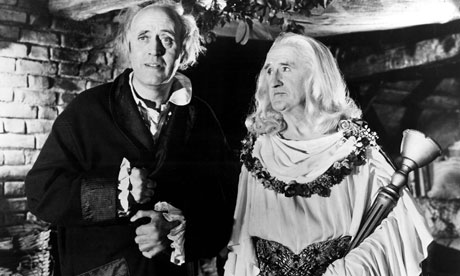
In Jerome K Jerome's introduction to his 1891 collection Told After Supper, he wrote: "Whenever five or six English-speaking people meet round a fire on Christmas Eve, they start telling each other ghost stories." If this is a magical season where wishes are granted, don't you long to return to such a delicious cultural consensus? The stark reality, however, is that in 21st-century Britain, where Christmas seems largely about swearing over the last trolley in Morrisons' car park, our festive culture has narrowed horribly. Music is provided by whatever collection of startled-eyed urchins have won The X Factor, dutifully whining manufactured ear rot. Television's highlights offer incomprehensible, adulterous cockneys weeping in a pub, or comely toffs being stoic in a stately home, and that's pretty much it until reality TV stars begin advertising white goods in the January sales.
The Victorians, who invented the modern Christmas, would be baffled by this cultural desert. Regardless that their seasonal celebrations were as a much of a concocted conceit as our own, theirs was crafted around charity, family, nostalgia and, most interesting of all, an enthusiastic embracing of the supernatural. The Christmas ghost story was one of their finest legacies, and it's only relatively recently that we've abandoned it as a treasured tradition.
The most famous Christmas ghost story of all, Charles Dickens' A Christmas Carol, was not, however, the tale that invented the genre. Dickens was responding to a convention well established before he penned the unrivalled perfection of Scrooge's four redemptive spirits. For people of the northern hemisphere, supernatural tales told around the hearth during the darkest hours of the year roll back further than the yule log. Before the Christian church so successfully hijacked winter solstice feasting in northern Europe by tacking on the invented birthday of a Middle Eastern carpenter, it was a time when communities believed spirits were most active and ancestral scores could be settled.
The leap of imagination that took these ingrained myths from the dark forests to middle-class Victorian parlours was an easy one, and the superstitions were revitalised as essential entertainment, propelled by the repeal of the newspaper tax in 1855 that began a rise in popular periodicals.
The Christmas editions of these, particularly the ones edited by Dickens himself, contained compulsory tales of the supernatural and sold in their thousands. This is because the Victorians were romantics and there's nothing more romantic than a belief in ghosts. It requires a particularly solipsistic optimism to believe that an individual's trauma, if suitably interesting, can break the bonds of death, and so it played to the vanity of the religious, finding a natural home in pious Victorian households. Whereas modern audiences might question why the act of a wronged housemaid taking her own life is sufficient to rattle the window panes of an old house while Auschwitz remains untroubled by spiritual disturbance, no such logic perplexed our forebears.
At the top of the long list of great supernatural writers read aloud each Christmas Eve – such as Joseph Sheridan Le Fanu, Elizabeth Gaskell, Algernon Blackwood and many more – the unrivalled master is still regarded as being the wonderful MR James, technically published an Edwardian but born and raised a Victorian. An Eton master who wrote his masterpieces to be read to his terrified boarders each Christmas Eve, his ghosts were not always standard formula. Many were vengeful and their quests linear, but the best by far were inexplicable, elemental and feral creatures, peripheral horrors that were never fully glimpsed, and could neither be explained nor placated.
When BBC1 ran an annual TV drama series in the early 70s entitled A Ghost Story for Christmas, it naturally adapted five of James's stories alongside one Dickens story and two undistinguished modern affairs, and it marked out Christmas for my generation. The grotesque eviscerated children in Lost Hearts, the horrific relentlessness of the ghost in A Warning to the Curious, absolutely everything about it was part of the exquisite Christmas treat of getting to stay up late and be utterly terrified.
Various attempts have been made since to revive the genre on TV, mostly failures with actors reading pompously in leather armchairs, so it seems unlikely that we can persuade the generation who adore torture porn movies and sexually abstaining teenage vampires that a half-seen shadow in a closed upstairs bedroom is enough to freeze the soul. Romance is all but dead, and in order to scare, ghosts demand it of us.
Still, perhaps worth a shot. This Christmas, why not get the children to switch off Call of Duty: Modern Warfare 3 for half an hour and try reading them The Stalls of Barchester Cathedral? Just promise them that Captain John "Soap" MacTavish bursts in at the end and totals the black cat with a single shot.

